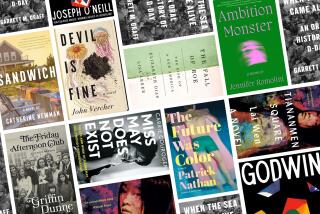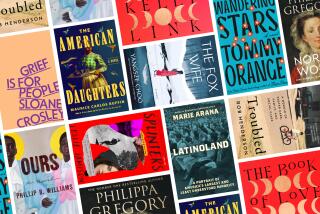Ocean Vuong’s ‘On Earth We’re Briefly Gorgeous’ animates the visceral beauty of youth
Ocean Vuong’s “Night Sky With Exit Wounds” was a work of unique brilliance that accomplished something else extraordinarily rare for a poetry collection: In addition to winning both the T.S. Eliot Prize for Poetry and the Whiting Award, the 2016 book sold well. His debut novel, “On Earth We’re Briefly Gorgeous” — which shares its title with a poem in that collection — could bring Vuong’s glittering, heartfelt vision to an even wider audience.
The novel takes the form of a letter from a son to his mother. “Let me begin again,” it opens. “Dear Ma, I am writing to reach you — even if each word I put down is one word further from where you are. I am writing to go back to the time, at the rest stop in Virginia, when you stared, horror-struck, at the taxidermy buck hung over the soda machine by the restrooms, its antlers shadowing your face.”
The narrator is a Vietnamese American writer in his late 20s identified only by his nickname Little Dog, and he writes to his mother about their family history, about war and violence, stories and language, about love and sex and loss and memory. His mother — a half-white, half-Vietnamese refugee who exists, like her son, because of the war in their native country — does not read English, and the letter, although written for her, is never meant to be read. “I only have the nerve to tell you what comes after because the chance this letter finds you is slim,” he says before describing his first sexual encounter. “[T]he very impossibility of your reading this is all that makes my telling it possible.”
The novel is expansive and introspective, fragmented and dreamlike, a coming of age tale conveyed in images and anecdotes and explorations. The plot, if you can call it that, is simple: a boy from Vietnam grows up in Hartford, Conn., raised in a household of women traumatized by war and domestic violence. As a teenager, he has a tender but fraught first relationship with another boy. Then Little Dog leaves Hartford for college in New York and becomes a writer.
It is tempting to read this book as memoir — it has an intimate, confessional tone, and Little Dog shares some key biographical details with Vuong — but “On Earth We’re Briefly Gorgeous” is explicitly a novel. Just as he fuels his prose with his poetry, Vuong takes what he needs from lived experience to animate his storytelling with visceral beauty and a strain of what feels like uncut truth. This is, of course, a difficult art, and one of the chief goals of many fiction writers.
In writing his letter, Little Dog seeks to understand and record both himself and his mother, a formidable, ever-shifting project: “Even when I know something to be true as bone I fear the knowledge will dissolve, will not, despite my writing it, stay real. I’m breaking us apart again so that I might carry us somewhere else — where, exactly, I’m not sure.” Part of this endeavor is unearthing the family trauma, trying to locate its origins and connect his family’s Vietnamese roots to the realities of their life in Hartford: their cultural, linguistic and financial hardships; his grandmother’s schizophrenia, his mother’s abuse. “I read that parents suffering from PTSD are more likely to hit their children,” he says. “Perhaps to lay hands on your child is to prepare him for war.”
He gleans some of the family lore from his grandmother Lan, who tells rambling stories as he kneels behind her and plucks her white hairs: “I came to know, in those afternoons, that madness can sometimes lead to discovery, that the mind, fractured and short-wired, is not entirely wrong. The room filled and refilled with our voices as the snow fell from her head, the hardwood around my knees whitening as the past unfolded around us.”
Vuong’s prose is strongest when it’s anchored to Little Dog and his family, or his relationship with his first love, a gentle boy who struggles with his masculinity and sexuality: “Trevor the carnivore, the redneck not a pansy, shotgunner, sharpshooter, not fruit or fairy.” Trevor is also a drug addict, one of many in Hartford hooked by the dangerous false promises of Purdue and OxyContin.
There are moments when the writing slips, becoming clumsy or cloying — just a tiny bit LiveJournal emo. These moments tend to happen when there is nothing else going on, when Little Dog’s poetic observations stand on their own, listed like fragments in a notebook: “The truth is one nation, under drugs, under drones”; “I know. It’s not fair that the word laughter is trapped inside slaughter.”
It’s impressive, though, that this doesn’t happen more often. “On Earth We’re Briefly Gorgeous” is a book of sustained beauty and lyricism, earnest and relentless, a series of high notes that trembles exquisitely almost without break. “In a world as myriad as ours, the gaze is a singular act: to look at something is to fill your whole life with it, if only briefly. Once, after my fourteenth birthday, crouched between the seats of an abandoned school bus in the woods, I filled my life with a line of cocaine.” For the duration of this marvelous novel, Vuong holds our gaze and fills it with what he wills — the migration of butterflies, love in a tobacco barn, purple flowers gathered on a highway.
::
“On Earth We’re Briefly Goregous”
Ocean Vuong
Penguin Press; 256 pp., $26
Cha is a novelist and editor.
More to Read
Sign up for our Book Club newsletter
Get the latest news, events and more from the Los Angeles Times Book Club, and help us get L.A. reading and talking.
You may occasionally receive promotional content from the Los Angeles Times.






